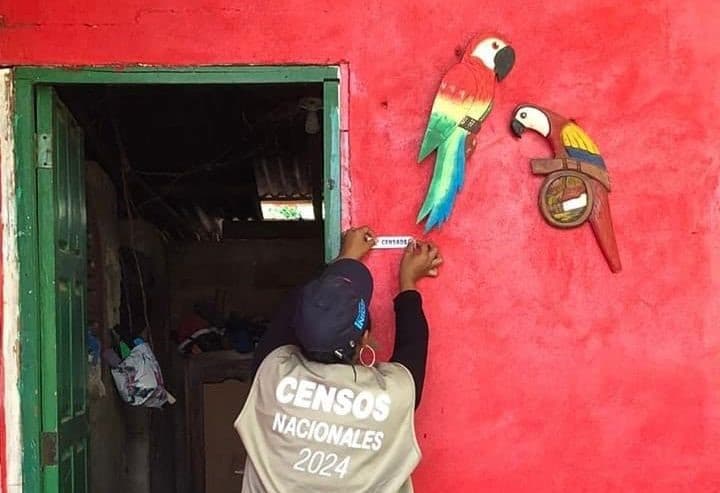26 de mayo 2024

Children of Exile: The Births “Sowing Hope” in the Camp of Nicaraguan Farmers

PUBLICIDAD 1M
PUBLICIDAD 4D
PUBLICIDAD 5D
Surveyors insist on asking about those who have migrated, the reasons, and the amount they send in remittances, according to three Managua residents

A surveyor places a sticker on the façade of a house to indicate that this dwelling has already been “censused.” Photo: Taken from Facebook
Managua residents Sara, Karla, and Cindy answered the questions of the National Population and Housing Census with “caution.” They were all warned by friends and family to be “careful” when providing information that could “flag” them as opposition members or “annoying people” to the dictatorship of Daniel Ortega and Rosario Murillo.
For Karla, 31, and a resident of a neighborhood near the Plaza de la Fe, it was the first time she participated in a census. The previous one, in 2005 under the government of Enrique Bolaños, was answered by her parents.
“I had seen some posts on Facebook about the census. Although they are questions about the family, some people told me to limit my responses and not to provide information about people who have gone to the United States or details that could compromise my family because with this Government you don’t know what they are looking for,” she said.
The Managua resident said she did not feel confident with the process, “because those conducting the census are members of the Sandinista Youth (JS).”
“I felt that the young woman who came to conduct the census was insistent on many of the questions. Even though I told her I had no family members abroad, she repeated the question and insisted on whether I received remittances from abroad,” she detailed.
Karla says it was evident that “the surveyor wanted to know” something beyond general information. “My brother left more than two years ago for the United States; he used to live here in the house. He left because he was threatened by those same JS people, as he participated in the 2018 marches,” she commented.
The National Census will be carried out throughout May 2024, with the participation of some 8,000 surveyors who are still walking the streets of the country wearing cream-colored vests, blue caps, and carrying a digital tablet to record the population’s responses.
This census is being conducted nine years late, as — according to technical recommendations — it should have been conducted in 2015.
Sara lives near the Oriental Market. She does not have social networks and was unaware that a census process was underway in Nicaragua, but a surveyor came to her home one weekend.
“The young man who came was wearing a shirt with Ortega’s image and his census badges. I was scared, and the first thing I thought was what I had done to warrant a visit,” the capital resident recounted.
However, after the surveyor explained the census process, Sara answered the questions that “at times became tedious.”
“It’s fine to answer questions about one’s educational level or the number of inhabitants in the house; but providing details about what one earns does not seem right,” she expressed.
Unlike Karla, Sara did provide information about her family members who migrated to the United States through humanitarian parole. This led to her being questioned about the number of relatives, the reasons for leaving the country, and details about the amount in remittances she receives monthly.
Sara said she felt “calm” after being censused, though she emphasized that, given the situation in Nicaragua, “it’s always good to stay alert.”
“I am not part of any (political) faction, but one must consider what is behind the census. They say it is to know the quality of life, but it can also be to keep us monitored and registered. With the Sandinistas, we cannot trust,” she concluded.
Social researchers warned that “there is distrust among the population” due to the context of political repression experienced since 2018. The Nicaraguan Institute of Development Information (Inide), in charge of the national census, has insisted that the information collected “will only be used for statistical purposes.”
In an interview with the program Esta Semana, social researcher Juan Carlos Gutiérrez warned that in various parts of Nicaragua, residents said they “will try not to respond, not to answer the door, or provide data that does not reveal their conditions.”
He explained that citizens are suspicious of how their data will be “used.” “The data can be used both for national quantifications and to know who to charge more taxes. Therefore, people also have that fear,” he emphasized.
Cindy, a resident of the Largaespada neighborhood in Managua, said that in her case, the surveyor extended the questions about the professions or jobs of her children and other members of her household.
“They asked me if each one had a car, roughly how much they spent on gasoline, where they worked, and how many hours they spent inside and outside the house,” she detailed.
Cindy believed that such questions only show that the Government intends to obtain “total control of information.”
“There are questions that are obviously very personal; it’s to have more information about each citizen. They say it’s to update data, but clearly, it’s a way to learn everything,” she said.
This article was published in Spanish in Confidencial and translated by Havana Times. To get the most relevant news from our English coverage delivered straight to your inbox, subscribe to The Dispatch.
PUBLICIDAD 3M
Confidencial es un diario digital nicaragüense, de formato multimedia, fundado por Carlos F. Chamorro en junio de 1996. Inició como un semanario impreso y hoy es un medio de referencia regional con información, análisis, entrevistas, perfiles, reportajes e investigaciones sobre Nicaragua, informando desde el exilio por la persecución política de la dictadura de Daniel Ortega y Rosario Murillo.
PUBLICIDAD 3D